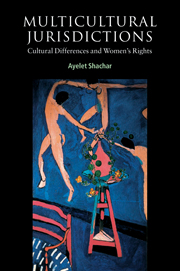Book contents
- Frontmatter
- Contents
- Preface
- 1 Introduction
- 2 The perils of multicultural accommodation
- 3 Family law and the construction of collective identity
- 4 State vs. nomos: lessons from contemporary law and normative theory
- 5 Sharing the pieces of jurisdictional authority: mapping the possibilities
- 6 Transformative accommodation: utilizing external protections to reduce internal restrictions
- 7 Conclusion
- Appendix: How transformative accommodation works in different social arenas
- References
- Index
1 - Introduction
Published online by Cambridge University Press: 22 September 2009
- Frontmatter
- Contents
- Preface
- 1 Introduction
- 2 The perils of multicultural accommodation
- 3 Family law and the construction of collective identity
- 4 State vs. nomos: lessons from contemporary law and normative theory
- 5 Sharing the pieces of jurisdictional authority: mapping the possibilities
- 6 Transformative accommodation: utilizing external protections to reduce internal restrictions
- 7 Conclusion
- Appendix: How transformative accommodation works in different social arenas
- References
- Index
Summary
From Canada to India, from Israel to the United States, the problem of multicultural accommodation is high on the global political agenda. In recognition of the importance of cultural diversity, various countries have begun to revisit their public policies, trying to find a more fitting system of accommodation for their varied communities. The hope is that since “we are all multiculturalists now,” we can explore ways in which state law can be rendered sufficiently pluralistic, allowing different communities to be governed by their own institutions and traditions. This trend toward group-based accommodation raises fundamental questions about the distribution of rights and authority in the multicultural state. These questions in turn focus our attention on the legal-institutional mechanisms of multiculturalism, and how they might affect not only the distribution of rights and authority, but also the distribution of social costs.
Both advocates and critics of multiculturalism have given much attention to the potential for accommodation to erode the social unity of already diverse polities. They are quite reasonably concerned that such societies will lose whatever “social glue” holds their citizens together. Yet relatively little thought is given to the effects that the distribution of differentiated rights can have upon the accommodated group members themselves. One of the aims of this book is to right this omission. Yet my inquiry does not stop there. If the state is to take identity groups seriously, we must re-examine yet another fundamental question of political life: that of institutional design and the division of authority.
- Type
- Chapter
- Information
- Multicultural JurisdictionsCultural Differences and Women's Rights, pp. 1 - 16Publisher: Cambridge University PressPrint publication year: 2001

